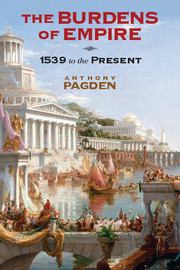Book contents
- Frontmatter
- Dedication
- Contents
- Preface
- Acknowledgements
- Introduction: Anatomy of Empire from Rome to Washington
- 1 Defending Empire: The School of Salamanca and the ‘Affair of the Indies’
- 2 ‘Making Barbarians into Gentle Peoples’: Alberico Gentili on the Legitimacy of Empire
- 3 The Peopling of the New World: Ethnos, Race, and Empire in the Early-Modern World
- 4 Conquest, Settlement, Purchase, and Concession: Justifying the English Occupation of the Americas
- 5 Occupying the Ocean: Hugo Grotius and Serafim de Freitas on the Rights of Discovery and Occupation
- 6 Cambiar su ser: Reform to Revolution in the Political Imaginary of the Ibero-American World
- 7 From the “Right of Nations” to the “Cosmopolitan Right”: Immanuel Kant's Law of Continuity and the Limits of Empire
- 8 “Savage Impulse-Civilized Calculation”: Conquest, Commerce, and the Enlightenment Critique of Empire
- 9 Human Rights, Natural Rights, and Europe's Imperial Legacy
- Bibliography
- Index
5 - Occupying the Ocean: Hugo Grotius and Serafim de Freitas on the Rights of Discovery and Occupation
Published online by Cambridge University Press: 05 March 2015
- Frontmatter
- Dedication
- Contents
- Preface
- Acknowledgements
- Introduction: Anatomy of Empire from Rome to Washington
- 1 Defending Empire: The School of Salamanca and the ‘Affair of the Indies’
- 2 ‘Making Barbarians into Gentle Peoples’: Alberico Gentili on the Legitimacy of Empire
- 3 The Peopling of the New World: Ethnos, Race, and Empire in the Early-Modern World
- 4 Conquest, Settlement, Purchase, and Concession: Justifying the English Occupation of the Americas
- 5 Occupying the Ocean: Hugo Grotius and Serafim de Freitas on the Rights of Discovery and Occupation
- 6 Cambiar su ser: Reform to Revolution in the Political Imaginary of the Ibero-American World
- 7 From the “Right of Nations” to the “Cosmopolitan Right”: Immanuel Kant's Law of Continuity and the Limits of Empire
- 8 “Savage Impulse-Civilized Calculation”: Conquest, Commerce, and the Enlightenment Critique of Empire
- 9 Human Rights, Natural Rights, and Europe's Imperial Legacy
- Bibliography
- Index
Summary
I
Adam Smith – echoing the Abbyé Guillaume Raynal – famously described the voyages of Columbus and Vasco da Gama as the “greatest and most important” events in the history of mankind. The origin of this conceit, although neither man mentions it, was the Spanish historian Francisco López de Gómara, and some version of it was still being repeated, albeit in a modified form, in the mid-nineteenth century by the Hegelian geographer Ernst Kapp and in the twentieth by Carl Schmitt. But whereas Gómara had seen the discovery of America (he makes no mention of Vasco de Gama) as an event in the history of the spread of Christianity, and Kapp was to see it, together, in his case with the circumnavigation of the globe, as marking the final stage of evolution of human civilization, what both Smith and Raynal understood by their claim was that the discovery of America and of a sea route to India marked the creation of the modern commercial system, of which Raynal's best-selling Philosophical and Political History of the Two Indies was both a history and a celebration. Columbus and Gama had, furthermore, not merely transformed geography and hugely increased the amount of transactionable merchandise in the world; they had united mankind, by linking together the four (major) continents of which the world had hitherto been divided.
The story of what the “discovery”, and in this context it truly was a discovery not an “encounter”, by Europeans of the worlds beyond Europe – first Africa, America, and India, and finally the Pacific – have meant for the European perception of their own environments is a narrative (or rather a series of narratives) whose origins are to be found in the ancient geographical vision of the world. In antiquity this world, the cosmos or mundus or orbis terrarum had traditionally been conceived as an island surrounded by the Ocean – Okeanos – an encircling river which constituted the final periodos and peirata, the boundaries and the limits which enclosed all humanity.
- Type
- Chapter
- Information
- The Burdens of Empire1539 to the Present, pp. 153 - 173Publisher: Cambridge University PressPrint publication year: 2015

